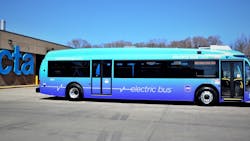Illinois to put remaining VW settlement money toward EV infrastructure
Illinois has revised how its remaining share of Volkswagen Settlement funding will be divided and has opted to invest the remaining $84.4 million on electric transportation and infrastructure.
The revised Beneficiary Mitigation Plan (BMP) to the Volkswagen Settlement Trustee was submitted in late April and will continue to focus funds in three priority areas most adversely impacted by the elevated nitrogen oxide emissions due to the number of subject VW diesel vehicles registered in these areas. These include the Chicago non-attainment area (Cook, DuPage, Kane, Lake, McHenry and Will counties, and portions of Kendall and Grundy counties); the Metro-East non-attainment area (Madison and St. Clair counties) and Champaign, DeKalb, LaSalle, McLean, Peoria, Sangamon and Winnebago counties.
The state says its revised plan will replace old diesel engines with all-electric school buses, public transit, Class 4-8 local freight trucks and light-duty charging infrastructure. Of the remaining $84.4 million, up to 32 percent, or approximately $27 million, will be used for all-electric public transit buses and public passenger/commuter locomotives.
"Paired with our nation-leading Climate and Equitable Jobs Act and electric vehicle and charging incentives, our Volkswagen settlement funds will further hasten Illinois' transition to clean energy with a focus on accessible electric transit options," said Illinois Gov. JB Pritzker. "The settlement alone will deliver more than $106 million in EV upgrades and infrastructure expansions throughout the state."
In 2018, the U.S. Public Interest Research Group (U.S. PIRG) issued a report that found Illinois’ initial plan to spend the money failed to prioritize electric transportation, leaving open the possibility that the money would not be used to help address air pollution and global warming.
U.S. PIRG Environment Campaigns Director Matt Casale called the updated Illinois BMP “a u-turn toward a cleaner and healthier transportation system for the Prairie State.”
“Getting to school or commuting to work shouldn’t include a daily dose of toxic pollution or increase the chances that people will get sick. We look forward to seeing this $84 million used for more emissions-free school and transit buses, putting Illinois on the road to cleaner air and a healthier future,” said Casale.
About the Author

Mischa Wanek-Libman
Group Editorial Director
Mischa Wanek-Libman is director of communications with Transdev North America. She has more than 20 years of experience working in the transportation industry covering construction projects, engineering challenges, transit and rail operations and best practices.
Wanek-Libman has held top editorial positions at freight rail and public transportation business-to-business publications including as editor-in-chief and editorial director of Mass Transit from 2018-2024. She has been recognized for editorial excellence through her individual work, as well as for collaborative content.
She is an active member of the American Public Transportation Association's Marketing and Communications Committee and served 14 years as a Board Observer on the National Railroad Construction and Maintenance Association (NRC) Board of Directors.
She is a graduate of Drake University in Des Moines, Iowa, where she earned a Bachelor of Arts degree in Journalism and Mass Communication.
